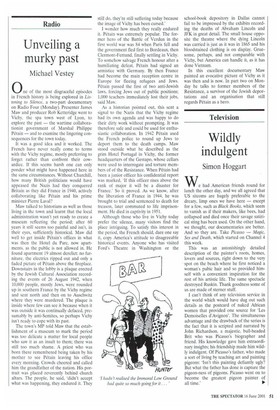Unveiling a murky past
Michael Vestey
One of the most disgraceful episodes in French history is being explored in Listening to Silence, a two-part documentary on Radio Four (Monday). Presenter James Maw and producer Rob Ketteridge went to Vichy, the spa town west of Lyon, to explore the past — the wartime collaborationist government of Marshal Philippe Main — and to examine the lingering consequences for the town today.
It was a good idea and it worked. The French have never really come to terms with the Vichy regime, mostly preferring to forget rather than confront their cowardice. If this seems harsh one can only ponder what might have happened here in the same circumstances. Without Churchill, how many British politicians would have appeased the Nazis had they conquered Britain as they did France in 1940, actively collaborating like Petain and his prime minister Pierre Laval?
Maw talked to historians as well as those living in the town and learnt that the local administration wasn't yet ready to create a museum reflecting the period; after 60 years it still seems too painful and isn't. in their eyes, sufficiently historical. Maw did well to get inside Retain's offices in what was then the Hotel du Parc, now apartments, as the public is not allowed in. He found apartment 19 almost derelict: no furniture, the electrics ripped out and only a• faded picture of Retain above the fireplace. Downstairs in the lobby is a plaque erected by the Jewish Cultural Association recording the events of 26 August 1942, when 10,000 people, mostly Jews, were rounded up in southern France by the Vichy regime and sent north and then on to Auschwitz where they were murdered. The plaque is inside where few can. see it because when it was outside it was continually defaced, presumably by anti-Semites, so perhaps Vichy isn't ready to cope with its past.
The town's MP told Maw that the establishment of a museum to mark the period was too delicate a matter for local people who saw it as an insult to them; there was still too much shame. A priest who was born there remembered being taken by his mother to see Petain leaving his office every morning. Crowds cheered and called him the grandfather of the nation. His portrait was placed reverently behind church altars. •The people, he said, 'didn't accept what was happening, they endured it. They still do, they're still suffering today because the image of Vichy has been cursed.'
I wonder how much they really endured it. Petain was extremely popular. The former hero of the Battle of Verdun in the first world war was 84 when Paris fell and the government fled first to Bordeaux, then Clermont-Ferrand, finally settling in Vichy. To somehow salvage French honour after a humiliating defeat, Petain had signed an armistice with Germany. By then France had become the main reception centre in Europe for fleeing refugees and Jews. Petain passed the first of two anti-Jewish laws, forcing Jews out of public positions; 1,000 teachers immediately lost their jobs. said Maw.
As a historian pointed out, this sent a signal to the Nazis that the Vichy regime had its own agenda and was happy to do their dirty work without prompting. It was therefore safe and could be used for enthusiastic collaboration. In 1942 Petain used the French police to round up Jews to deport them to the death camps. Maw stood outside what he described as the grim Hotel Portugal in Vichy, the former headquarters of the Gestapo, whose cellars were used to interrogate and torture members of of the Resistance. When Retain had been a junior officer his confidential report was marked, 'If this officer rises above the rank of major it will be a disaster for France.' So it proved. As we know, after the liberation of France in 1944, he was brought to trial and sentenced to death for treason, later commuted to life imprisonment. He died in captivity in 1951.
Although those who live in Vichy today prefer the silence, many visitors find the place intriguing. To satisfy this interest in the period, the French should, dare one say it, copy America's attitude to disagreeable historical events. Anyone who has visited Ford's Theatre in Washington or the school-book depository in Dallas cannot fail to be impressed by the exhibits recording the deaths of Abraham Lincoln and JFK in great detail. The small house opposite the theatre where the dying Lincoln was carried is just as it was in 1865 and his bloodstained clothing is on display. Gruesome, perhaps, and not comparable with Vichy, but America can handle it, as it has done Vietnam.
In this excellent documentary Maw painted an evocative picture of Vichy as it was then and is now. In part two on Monday he talks to former members of the Resistance, a survivor of the Jewish deportations and an organisation that still regards Petain as a hero.


































































 Previous page
Previous page